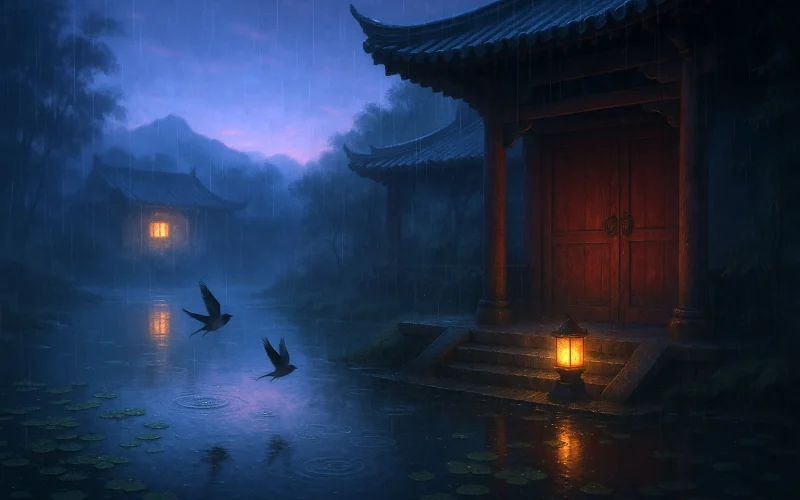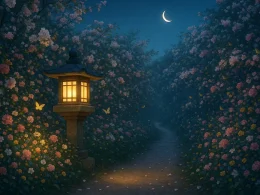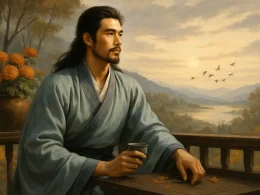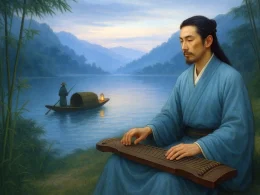Maple-xylem hemorrhages dusk,
Watersheds metastasize—exile's husk.
I biopsy mist's biopsy,
Goose-cries splice moon's lumpectomy.
Ethanol metabolized,
Tears hydrolyze wax-alloys.
Wind's CNC mills gold-foil voids.
Pestle-sonogram aborts my REM,
Silk-chitin molt unspools old phloem.
Gazebo amputation site,
Worst graft—her epidermal plight.
How ligate this xylem wound?
No vascular reunion found.
Ink floods cellulose in vain,
Her mineral drip stains song-chain.
All lignin pain—
Photosynthesis' stain.
Original Poem
「风流子 · 枫林凋晚叶」
枫林凋晚叶,关河迥,楚客惨将归。
望一川暝霭,雁声哀怨;半规凉月,人影参差。
酒醒后,泪花销凤蜡,风幕卷金泥。
砧杵韵高,唤回残梦;绮罗香减,牵起馀悲。亭皋分襟地,难堪处,偏是掩面牵衣。
周邦彦
何况怨怀长结,重见无期。
想寄恨书中,银钩空满;断肠声里,玉筯还垂。
多少暗愁密意,唯有天知。
Interpretation
This long-form ci was composed in Zhou Bangyan's later years upon his departure from Jingzhou, where he had resided for five years and formed a profound romantic attachment. Written during his return journey to Bianjing, the work intertwines reminiscence of a farewell night with lingering attachment, blending scene-painting, emotion, nostalgia, and dream vision into a poignant tapestry of restrained yet deeply moving artistry. Rather than direct exposition, Zhou employs symbolic landscapes and allusions to weave an intricate portrayal of separation—subtle yet profound, intense yet never cloying—marking a pinnacle of his artistic achievement.
First Stanza: "枫林凋晚叶,关河迥,楚客惨将归。"
Fēng lín diāo wǎn yè, guān hé jiǒng, Chǔ kè cǎn jiāng guī.
Maple woods shed leaves in twilight,
rivers and passes stretch endless—
this Chu wanderer turns homeward in sorrow.
The opening triad establishes autumnal departure. "Maple woods shed leaves" (枫林凋晚叶) transforms seasonal decay into emotional metaphor, while "rivers and passes stretch endless" (关河迥) amplifies geographical and psychological distance. The self-identification as "Chu wanderer" (楚客) invokes the melancholic legacy of Chu Ci elegies, embedding personal grief within literary tradition.
"望一川暝霭,雁声哀怨;半规凉月,人影参差。"
Wàng yī chuān míng ǎi, yàn shēng āi yuàn; bàn guī liáng yuè, rén yǐng cēn cī.
Gazing on mist-veiled plains,
where wild geese lament;
a crescent's chill gleam,
our silhouettes fractured in lamplight.
This quatrain constructs a multisensory farewell tableau. The "mist-veiled plains" (暝霭) and "lamenting geese" (雁声哀怨) externalize inner turmoil, while the "fractured silhouettes" (人影参差) under cold moonlight visually fragment the lovers' unity, foreshadowing separation's inevitability.
"酒醒后,泪花销凤蜡,风幕卷金泥。"
Jiǔ xǐng hòu, lèi huā xiāo fèng là, fēng mù juǎn jīn ní.
Sobering, my tears melt phoenix candles,
while wind lifts gilt-edged drapery.
Post-inebriation brings cruel clarity—tears erode the luxurious "phoenix candles" (凤蜡), and wind disrupts the "gilt-edged drapery" (金泥), dismantling the opulent setting of their last night together. Zhou contrasts material splendor with emotional desolation through exquisite visual detail.
"砧杵韵高,唤回残梦;绮罗香减,牵起馀悲。"
Zhēn chǔ yùn gāo, huàn huí cán mèng; qǐ luó xiāng jiǎn, qiān qǐ yú bēi.
Pounding clothes pierces dreams,
silken fragrance fades,
reawakening lingering sorrow.
The auditory intrusion of laundry pounding (砧杵)—a traditional symbol of domesticity and longing—ruptures dreamlike remembrance, while dissipating perfume (绮罗香减) marks time's erosion of sensory intimacy, "reawakening sorrow" (馀悲) through synesthetic triggers.
Second Stanza: "亭皋分襟地,难堪处,偏是掩面牵衣。"
Tíng gāo fēn jīn dì, nán kān chù, piān shì yǎn miàn qiān yī.
At riverside pavilion we parted—
most unbearable,
her veiled face clutching my sleeves.
The stanza crystallizes the farewell's pivotal moment. The "riverside pavilion" (亭皋) becomes an eternalized space, while "veiled face clutching sleeves" (掩面牵衣) captures the physical grammar of attachment—a gesture both intimate and desperate, preserved in memory's amber.
"何况怨怀长结,重见无期。"
Hé kuàng yuàn huái cháng jié, chóng jiàn wú qī.
What's worse, our grievances knot eternally,
no hope of reunion.
The admission of "no hope of reunion" (重见无期) transforms temporary separation into permanent loss, with "knotted grievances" (怨怀长结) suggesting emotional entanglement that time cannot unravel.
"想寄恨书中,银钩空满;断肠声里,玉筯还垂。"
Xiǎng jì hèn shū zhōng, yín gōu kōng mǎn; duàn cháng shēng lǐ, yù zhù hái chuí.
In letters I'd vent sorrow,
but silver ink traces lie empty;
amid heartbreak's sobs,
jade hairpins still dangle tears.
The futility of written catharsis ("silver ink traces lie empty" 银钩空满) contrasts with the enduring visual of tear-drenched hairpins (玉筯还垂), demonstrating how material objects outlast emotional expression—a typically Zhou-esque paradox.
"多少暗愁密意,唯有天知。"
Duō shǎo àn chóu mì yì, wéi yǒu tiān zhī.
So many hidden sorrows and secrets,
known only to heaven.
The celestial conclusion ("known only to heaven" 唯有天知) elevates personal grief to cosmic scale, while its deliberate vagueness invites readers to project their own "hidden sorrows" (暗愁密意) into the poetic void.
Holistic Appreciation
Zhou constructs a psychological diptych: the first stanza's sensory overload (falling leaves, geese cries, candle tears) gives way to the second's emotional crystallization (clutching sleeves, knotted grievances, silent tears). This movement from external to internal mirrors the lovers' journey from physical presence to metaphysical absence.
The poem's temporal architecture is particularly masterful—memory's nonlinearity allows past (parting scene), present (sobering aftermath), and future (eternal separation) to coexist. The "pounding clothes" that "pierces dreams" becomes a sonic metaphor for history's intrusion upon nostalgia, while "jade hairpins still dangling tears" suggests grief's endless present tense.
Artistic Merits
- Botanical pathos
The autumnal maples (枫林) don't merely shed leaves—they enact the lovers' emotional defoliation. - Lacrimal alchemy
Tears transmute from candle-eroding fluids (泪花销凤蜡) to jewelry-adorning gems (玉筯还垂), tracing sorrow's material journey. - Sonic symbolism
Wild geese's cries (雁声哀怨) and laundry pounding (砧杵韵高) form an elegiac soundscape of seasonal and domestic cycles. - Epistolary futility
The "empty silver ink traces" (银钩空满) critique language's inadequacy before profound emotion—a meta-commentary on poetry itself.
Insights
Zhou's poem reveals how farewells fossilize moments: the clutching of sleeves becomes eternal sculpture, tears turn to crystalline pendants. This transformation of ephemeral gestures into permanent art speaks to poetry's memorializing power—its ability to make "no hope of reunion" paradoxically reunite readers with lost loves across centuries.
For contemporary audiences, the work demonstrates grief's nonlinear temporality. The simultaneous existence of past (parting), present (writing), and future (eternal separation) in the poem mirrors modern understanding of traumatic memory—how pivotal moments exist outside chronological time.
Ultimately, the poem suggests that the most profound emotions resist communication. The concluding "known only to heaven" isn't evasion but recognition—some experiences transcend language, finding expression only through art's symbolic vocabulary. Zhou thus positions poetry not as emotional outlet but as sacred encryption, where "hidden sorrows and secrets" await decoding by kindred souls across time.
About the Poet
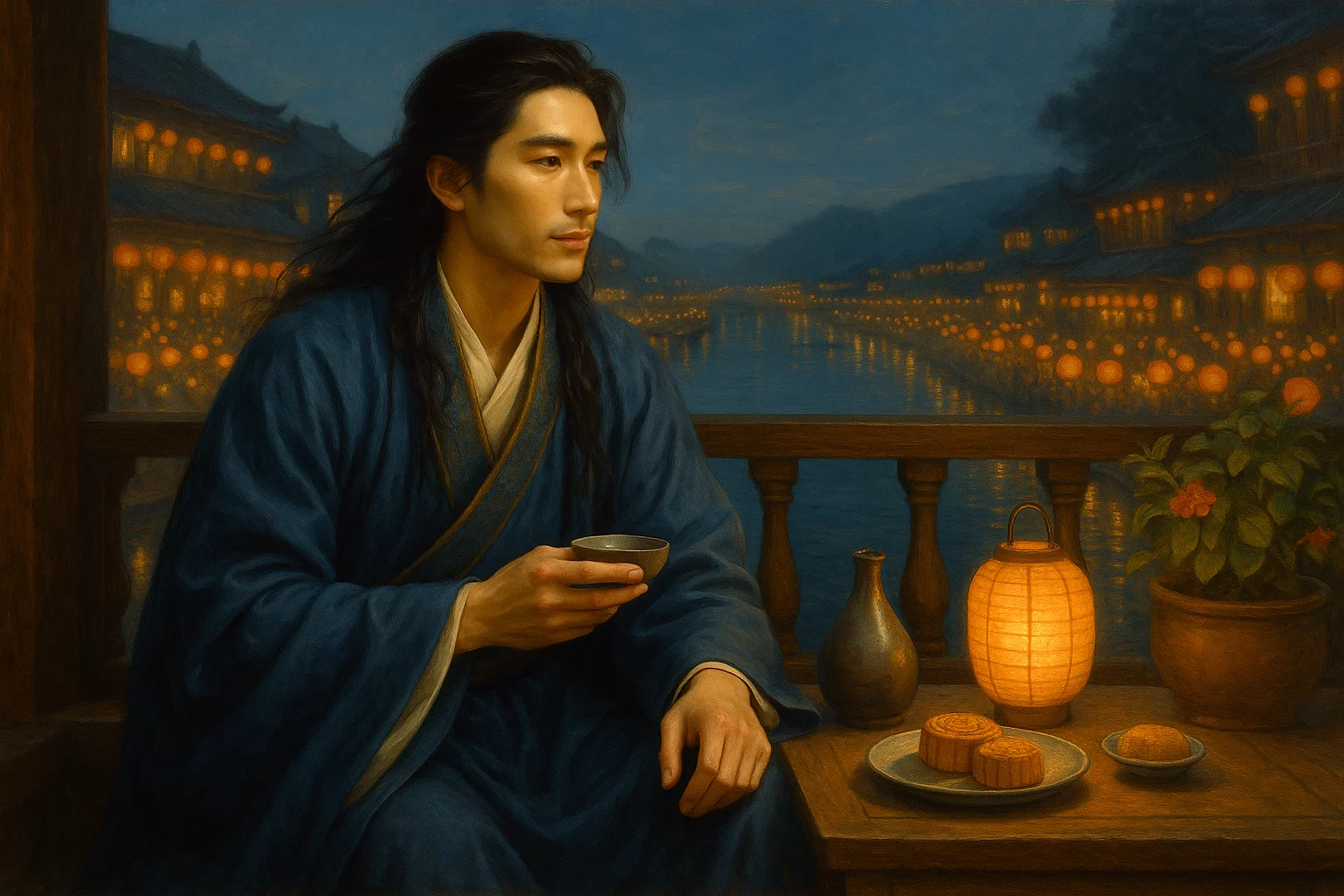
Zhou Bangyan (周邦彦 1056 - 1121), a native of Qiantang (modern Hangzhou, Zhejiang), was the culminating master of the wanyue (graceful and restrained) ci poetry of the Northern Song Dynasty. A virtuoso in musical temperament, his ci are renowned for their opulent refinement and technical perfection. He created dozens of new melodic patterns (cipai) and adhered to strict tonal rules, earning him the title "Crown of Ci Poets." His influence extended to Southern Song masters like Jiang Kui and Wu Wenying, establishing him as the founding patriarch of the Rhymed Ci School.







